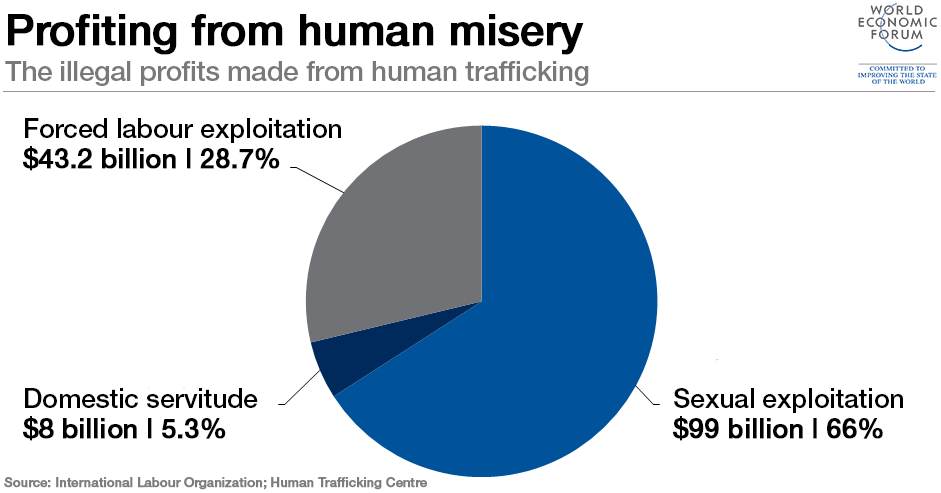What can businesses do about human trafficking?

Globally, 21 million adults and children are forced into unpaid labour and subjected to violence and torture. Human trafficking is part of a global web of activities that make up the shadow economy. Interventions and solutions require action by various segments of society – but what specifically can the private sector do to combat the problem?
A new briefing paper by the World Economic Forum and recent toolkit tackle this important question.
The private sector has launched inventive approaches to combat human trafficking, and different sections of it have developed pioneering models. The financial sector has demonstrated that technology and data analysis tools can be used to follow transactions and identify potential traffickers. The technology sector has shown that by supporting research and collaborative efforts between multiple external stakeholders, including public-private partnerships, a better understanding can be gained of how technology is used to facilitate human trafficking.
Source: Human Trafficking Centre
In the hospitality and tourism sector, engagement of corporate leaders at the top can create systemic change throughout the company in terms of anti-trafficking practices, expanding also to other sectors. The transportation sector illustrates how individuals and employees can also make a difference through raising awareness, enhancing prevention, and also flagging possible cases of trafficking. The hospitality and transportation sectors also demonstrate how entrepreneurial thinking and innovation can provide support for survivors of trafficking.
But beyond these promising practices, what could the next steps be? Firstly, good practices should be shared across sectors to foster dialogue and transparency. Simply discussing them may lead to replication in other areas. It is also vital to begin to engage academic institutions, particularly business and public-policy schools, in training the next generation of corporate and community leaders in anti-trafficking strategies and solutions. Coursework and activities could focus on entrepreneurship and innovation as more and more companies engage in tackling human trafficking and business models can be applied to solving this egregious human rights abuse.
Businesses play a critical and important role in the fight against trafficking. Whether they remain within the private sector or collaborate with governments and academia, they can wield a wider influence and cause this dark corner of the illicit economy to diminish even further.
The Summit on the Global Agenda 2015 takes place in Abu Dhabi from 25-27 October. The report, State of the Illicit Economy, is available here.
Author: Christina Bain, Director of the Initiative on Human Trafficking and Modern Slavery, Babson Social Innovation Lab, Babson College
Image: Two young boys are handcuffed at a local liquor factory in Kabul June 29, 2010. REUTERS/Omar Sobhani
Don't miss any update on this topic
Create a free account and access your personalized content collection with our latest publications and analyses.
License and Republishing
World Economic Forum articles may be republished in accordance with the Creative Commons Attribution-NonCommercial-NoDerivatives 4.0 International Public License, and in accordance with our Terms of Use.
The views expressed in this article are those of the author alone and not the World Economic Forum.
Stay up to date:
Drivers of War
Related topics:
Forum Stories newsletter
Bringing you weekly curated insights and analysis on the global issues that matter.
More on Economic GrowthSee all
Rishika Daryanani, Daniel Waring and Tarini Fernando
November 14, 2025









